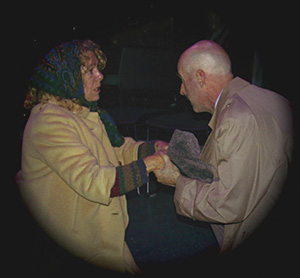
“Women of Lockerbie” is written by Deborah Brevoort and directed by Allen Ebert. The poetic drama took place on the Mitby Theater stage at Madison College from Friday Oct. 13 through Sunday Oct. 22.
The setting of the play takes place in Lockerbie, Scotland. A small village that experienced the tragic aftermath of the bombing of the Pan Am 103 flight. A grieving mother roams the hills of Lockerbie, Scotland searching for her son’s remains years after the bombing. She and her husband meet the women of Lockerbie who are trying to prevent the U.S. government from destroying the clothes of the victims,
so they can gift the clothes to the grieving families of the people who were killed.
I felt this play displayed grief in its rawest form. We see the mother, Madeleine Livingston, wandering, in the manic sadness of trying to find her son in the hills of Lockerbie. Swaying between madness and grief, her husband, Bill Livingston calls for her on the main stage. They both meet up with the women of Lockerbie in the hills, and begin to speak of the after effect of what the plane crash had done.
The older ladies show deep love and feeling for the loss the people had felt. They even experienced the loss of their own families, like Olive, who lost her husband and daughter in the crash.
The themes in this play revolve around grief and kindness. Madeleine, the grieving mother who lost her son during the plane bombing, is roaming the hills, trying to search for her son. We see very easily that the mother is facing a great amount of pain, and we later realize that she feels this way because she never found or received any form of his body or belongings after her son’s death. She only wants something of her son’s. The father, Bill Livingston, hasn’t had a single chance to grieve the loss of his son, because he had to take care of his wife’s delicate mind. There is conflict between Olive and her ladies and George Jones when they beg to have the clothes. He refuses, and it results in the women becoming angry and frustrated from his unwillingness. Until they take things into their own hands, and rebellion ensues from the ladies.
The director’s interpretation of the play shows how they put the raw form of grief embedded into the play. From the beginning, the audience feels a sort of pain and sadness for Madeleine and eventually all of the characters. One quote in particular from the play that represents it says, “You can’t reason with grief. It doesn’t have ears to hear you.” The families and citizens living in Lockerbie experience grief and loss, like Olive. We see the raw emotion coming from all of the characters. From how they wail from grief and to anger and frustration from the U.S. government who have power over them.
One character that needs mentioning is Madeleine Livingston, an American mother who lost her son during the plane bombing. She has been in the grieving process for over seven years after her son’s death. We see her pain in the way she is searching aimlessly through the hills of Lockerbie, trying to find some minuscule evidence of her son. She was angry at herself and putting blame on herself for how she could have done things differently. Her husband Bill, who had to pick up the pieces after their son’s death, is constantly searching for her in those hills. Madeleine is played as almost a mad woman. We see this in the way she portrays her character, with wide eyes glossed over, wandering, and wailing, she is grief stricken. She never got closure after her son’s death, so slowly over time she lost her mind in the process. She is dangerous to herself and her husband, towards the end of the play she literally tears herself apart and bleeds everywhere, finding nothing in the warehouse of the dead people’s belongings.
Olive, a native Lockerbie resident, wants to gain access to the warehouse where the plane victim’s belongings and clothes are. Olive and her girls meet the Livingston’s and give a shoulder for them to place their burdens. She tries to help them, and gives them advice like a sweet grandma. Her main goal is to wash those clothes and give the Livingston’s and the victim’s family closure in the event that took place. Her motivations are due to her husband and daughter who died in Lockerbie after the plane crashed down. She begs on her knees to George Jones to have the clothes, but he refuses. She becomes so angry and distraught and almost gives up on her advances, but eventually we see that she is determined to find a person who she could trust to gain access to the warehouse.
Madeleine’s character played the well-established role of a grieving mother in pain. I really believed that she was distraught, and her performance was marvelous. After telling the story of how she found out about the plane crash, after describing the scene, she wailed loudly perfectly embodying the pain that she felt.
George Jones portrayed his character as U.S. government officials well. He displayed businessman energy from the beginning. He is a hardheaded man, who only follows what the government tells him to do. He says no to every advance Olive tries to get through to him, and to some degree a very unlikeable antagonist. But towards the end we see Mr. Jones carrying the Livingston’s son’s suitcase and gifting it to them. He starts to let go of his hardhead act and gives up on the upheaval of the women of Lockerbie. He starts to become kind and allows them to wash the clothes.
While entering through the entrance of the Mitby Theater, lined along the walls was the timeline of the lead up and aftermath of the Pan Am 103 bombing. The timeline gave more detail and effect of the tragedy the plane crash caused.
At the first glance, the hallway leads you into the theater towards the stage. The location of the play took me aback a bit when I realized that the stage was part of the seating as well as the main stage for the actors. While you are sitting, you feel like you are in the middle of a scene, making it more personal to what the characters are experiencing.
The main set of the stage was a cobblestone wall platform/stair with a creek-like water way in the middle. The scenes are portrayed as though it is outside, with a silent reverie of crickets chirping in the background. The lights are low, making it seem like it is nighttime. All the scenes took place on this wall. In the distance of the stage, the characters call for each other, portraying a sense of distance added to the play.
The accents of the Scottish characters were very believable, never swaying to their original American ones. The costumes were well placed, we can differentiate the location of the character’s original homes by how the Livingston’s dressed more modern and in a business suit. The older women of Lockerbie wear knee length dresses and sweaters, a humbler form of clothing.
I thoroughly enjoyed this play. It demonstrated the real grief and sadness a mother can feel when her child dies. It also shows bravery at its finest with the women who dared to go against the U.S. government which I found very admirable. This play really tugged at my heart strings, and I may have cried a bit after the parents received their son’s luggage at the end. It felt like relief after having been hanging on with the pain the play gave to the audience to feel. Overall, it was a beautiful play.























